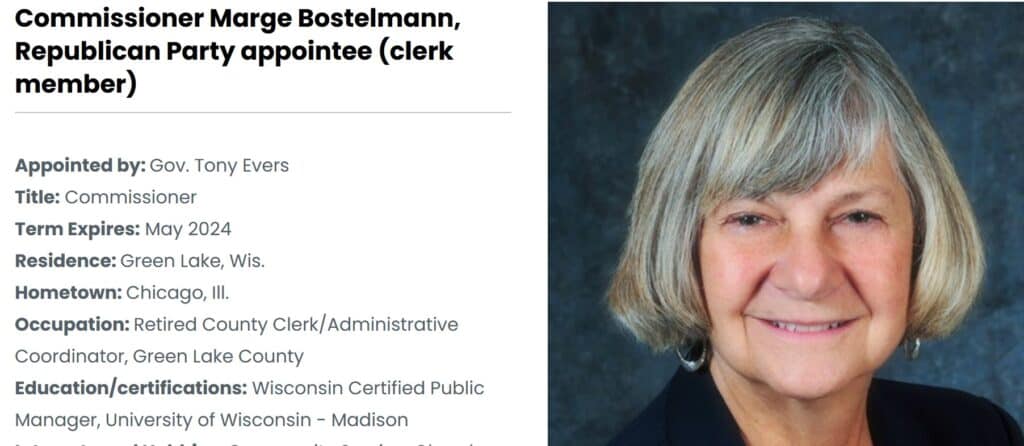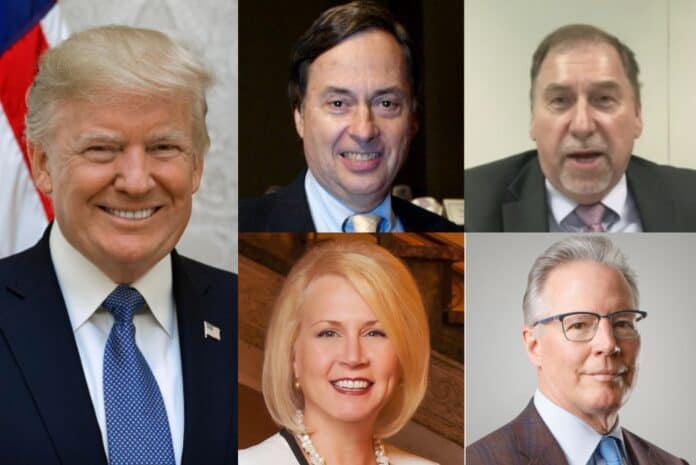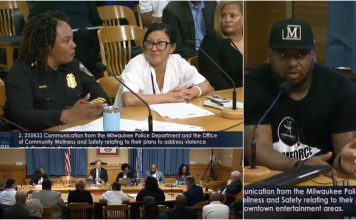“I can not think of anything less American…this is something that goes along the lines of third world countries” – Republican Wisconsin Election Commissioner Robert Spindell, after the commission voted 5-1 to pass a new emergency rule on ballot access procedures
A Republican appointee to the Wisconsin Election Commission, Don Millis, said at Thursday night’s meeting that he believes it will take four votes for a candidate to make the Wisconsin ballot in the event of a challenge.
The commission is deadlocked with three Democratic appointees (including two major Joe Biden donors) and three Republican appointees (including one appointed by Democratic Gov. Tony Evers.)
Millis, an appointee of Assembly Speaker Robin Vos, then joined the three Democrats and another Republican member, Marge Bostelman, in a 5-1 vote to create an emergency rule to establish procedures for ballot access challenges, including of presidential candidates.
The lone Republican no vote, Bob Spindell, said the rule could prevent a candidate like former President Donald Trump from being put on the Wisconsin ballot on the basis of moral questions. It would also apply to local and state candidates, he said.
Millis’s comments came after one of those Biden donors, Milwaukee trial attorney Mark Thomsen stated during the meeting “We’re going have a discussion on the Commission on the 14th Amendment.” The WEC meeting occurred as a national debate escalates over attempts to keep Trump off the ballot using that Amendment, a Confederate-era provision barring people who engage in “insurrection” or “rebellion” from holding federal office.
However, Millis told WRN after the meeting: “The requirement for 4 votes applies only to offices where the candidate gets on the ballot through the nomination paper process. Candidates for president nominated by parties with ballot status (e.g., GOP and Democrat) do not get on the ballot using nomination papers. This applies in the general and presidential preference elections.”
He added: “In the event there is a challenge to a candidate for president who does not require nomination papers (e.g., Biden, Trump, DeSantis, Pence, Haley, etc.), it would require 4 votes to remove the candidate. Lacking 4 votes, the challenge fails.”
Here’s Democratic commissioner Mark Thomsen talking about the 14th Amendment:
“At the end of the day, no one gets on the ballot without four votes,” Millis said. He then raised the scenario where “no one gets on the ballot…Three commissioners just say we’re not going to vote for all of them.”
The Republican appointee conceded a point that conservative legal scholars don’t all agree on. For example, in a stinging dissent when the Green Party candidates were denied Wisconsin ballot access in 2020 after a deadlocked vote, conservative State Supreme Court Justice Rebecca Bradley wrote, “A 3-3 decision makes clear that the presumption of validity was not overcome.”
In other words, she’s saying that, if the commission deadlocks, it should mean a challenge was not proved. Commissioner Ann Jacobs, also a Democratic appointee, gave $1,000 to Biden less than a month after she voted to boot the Greens from the Wisconsin ballot.
Millis told commissioners that he doesn’t believe WEC has the authority to decide on the 14th Amendment, though, saying, “Administrative agencies do not have the authority to entertain constitutional questions.” However, Thomsen, a trial lawyer from Milwaukee who has made a cottage industry out of suing police, did not concede that point, saying that it’s a “very good public discussion to have” and claiming he had not researched the law.
Bostelman is a former county clerk who was appointed to the commission by Democratic Gov. Tony Evers, who made the “Republican Party clerk” appointment, according to the Election Commission’s website.

She previously was rebuked by her home county’s Republican party for her handling of special voting deputies in nursing homes during a pandemic-era election.
Spindell, a Republican appointee named by Senate Majority Leader Devin LeMahieu to the Commission, argued that the new emergency rule was unnecessary, came out of the blue, and paved the way for the Commission to consider the character of a presidential candidate, not just technical questions like whether a person gathered enough nomination signatures (which presidential candidates don’t need to do.)
Spindell was also the lone no vote on the special voting deputy issue, which led to a criminal referral by the Racine County DA against the other five commissioners at the time, although no charges resulted.
“This is a terrible thing. It should be killed right now. There is no need for it,” Spindell said of the new emergency rule. “All of a sudden, it came out of nowhere with all this stuff on TV and everything else about trying to knock Trump off the ballot. We haven’t had this for a hundred years.”
However, Spindell concurred with Millis by saying, “I think it takes four votes to get someone actually on the ballot.”
On Thursday, election commission staffers told commissioners the emergency rule was “only intended to bring a clear process” because there is “currently no clear administrative or statutory process” for handling ballot access challenges that aren’t nomination signature issues.
Millis said that if someone “wanted to challenge the ballot status of a presidential candidate, there is really no way to do that.”
He then expressed his “personal opinion on the 14th amendment after years of litigating,” saying that “if you’re challenging a statute, law or action based on the Constitution, an administrative body (like WEC) is not allowed to entertain it, only the courts can.”
Millis added: “The thought that the Commission could entertain a complaint under the 14th Amendment is clearly contrary to Wisconsin law,” and he said he had briefs from the Department of Justice on that point.
The emergency rule, he said, was “simply a way to provide clarity.”
‘We Should Kill This Thing Right Now’
“We should kill this thing right now,” Spindell countered. He said the rule change would allow the WEC to consider “ballot access challenges against candidates who do not file nomination papers,” like presidential candidates.
“I can not think of anything less American…this is something that goes along the lines of third-world countries,” Spindell said.
Dan Lennington, an attorney with the Wisconsin Institute for Law and Liberty told The Center Square that he agrees with Spindell that creating a formal procedure to challenge whether certain candidates should be on the ballot opens the door to challenges and lawsuits.
“If you put out a rule that says ‘If you think a candidate is disqualified from being on the ballot,’ what do you think is going to happen?” Lennington told The Center Square. “[WEC] is just inviting to be inundated with petitions to disqualify Trump.”
Lennington told The Center Square that WILL won’t defend Trump. But he said someone will.
“It’s not a question of if there will be lawsuits, but how many lawsuits there will be,” Lennington added. “I imagine someone will sue WEC to keep Trump off the ballot. And I expect suits in Dane County and Milwaukee County to keep Trump off the ballot.”
WEC staffers wrote in their memo of scope that, under the new change, “the challenge to the Declaration of Candidacy would be brought to the Commission, or to the local filing officer. The proposed rule would identify the legal grounds for bringing these types of challenges by incorporating or cross-referencing the appropriate provisions in § 8.21, § 8.30, or both.”
According to the memo, “the proposed rule would also describe the procedures by which the Commission or filing officer hear and decide these complaints, as well as the ability of an individual to seek review of the Commission’s or filing officer’s decision on their complaint.”
There is “currently no clear administrative or statutory process for an individual to challenge the validity or sufficiency of a candidate’s Declaration of Candidacy, which includes challenges to the candidate’s sworn certification that he or she meets or will meet the applicable requirements for holding office,” the memo says. “In the administrative code, Rule EL 2.07 only explicitly applies to challenges to nomination papers.”
“The challenge to the Declaration of Candidacy would be brought to the Commission, or to the local filing officer. The proposed rule would identify the legal grounds for bringing these types of challenges by incorporating or cross-referencing the appropriate provisions in § 8.21, § 8.30, or both.”
There is “currently no clear administrative or statutory process for an individual to challenge the validity or sufficiency of a candidate’s Declaration of Candidacy, which includes challenges to the candidate’s sworn certification that he or she meets or will meet the applicable requirements for holding office. In the administrative code, Rule EL 2.07 only explicitly applies to challenges to nomination papers,” the documents say.
He added: “We’re saying here, I think from what I read, just one person… can challenge any candidate who files a declaration of candidacy. They have the ability to do that.”
Spindell continued, “Let’s just kill this whole thing. We should not get into the position of challenging people in terms of their character, whether they might have committed insurrection, a drunk driving charge.” He said it should be “up to the voters to choose who they want to vote for.”
Thomsen told Spindell he was doing the commission “a great disservice when you put it out like you just did.” He said it’s nothing new for the commission and its predecessors to hear challenges of declarations of candidacy.
Spindell asked for examples where that occurred outside of nomination papers and was only told residency challenges.
“This simply sets up a procedure for rules on how to do it,” Thomsen said. “This doesn’t prejudge anything.”
Thomsen indicated that he was among those asking for the emergency rule, saying, “We asked the staff to provide clarity. This is just procedural.”
He brought up the 14th Amendment question, saying that Millis had said “the law precludes us from reaching constitutional issues. Maybe he’s right.” He said Millis was “way ahead of reading on this issue than me.”
Thomsen alleged, “It does a disservice to the public by yelling wolf when there’s no wolf there.”
Bostelman, the Evers’ appointee who holds one of the three Republican seats, said the change “puts it more in a procedural manner” and noted “we will still receive declaration of candidacy challenges. All this does is clarify how those challenges will come to us in the future.”
Millis said the proposed rule would “identify the legal grounds for bringing these types of challenges.” The Commission would get to vote on the exact language later.
However, Spindell responded that he couldn’t remember a past challenge “that got into whether this person was morally fit or whatever. It was solely mechanical. This has never happened, so we have a rush, rush, rush, an emergency rule. I think we’re just going down the bad path here; there’s no need to do it.”
He added, “Maybe the 14th Amendment does not apply here,” but noted, “This thing came out of the blue.”
Spindell noted that the Commission received about 300 emails urging them to pass the emergency rule, which he attributed to a “pretty organized operation” by Democrats and noted that this “points out to the three Republicans that we shouldn’t even get close to this. We shouldn’t go down this primrose road.”
Jacobs retorted to Spindell, “Everything you just said is a complete and total fabrication. It is untrue. It is false. It is a myth. It is a conspiracy theory.”
She said the rule was a “procedural recommendation to streamline challenges that already exist.”
Jacobs said the WEC can reject challenges based on frivolous reasons like someone smelling bad or “because they are unkind to kittens and puppies” or because “this person prefers grape bubblegum.”
She rejected claims there is a “grand conspiracy,” saying of complaints, “If they don’t follow the statutes, we can find them to be frivolous.”
“I’m so profoundly disappointed you are putting this on social media that this is some weird conspiracy to keep candidates off the ballot,” said Jacobs.
Spindell insisted, “I would hope we wouldn’t go down this rat hole.”
The drumbeat to keep Trump off state ballots started among a group of law professors, including Trump critics and a prominent liberal professor, who are weaving a foundation for ballot access challenges relating to the 14th Amendment. It won’t matter if Trump is kicked off the ballot in blue states. He won’t win them anyway.
The real game will be to kick him off the ballot in a battleground state like Wisconsin.
The key passage in the 14th Amendment bans former civilian or military officials from holding office if they “shall have engaged in insurrection or rebellion” against the United States government. It was created in the wake of the Civil War to prevent former Confederates from becoming president or controlling Congress.
In June 2020, according to FEC records, Thomsen donated $1,000 to Biden for President and $1,000 to the Biden Victory Fund in June 2020. He also gave $2,800 to Kamala Harris and $1,000 to the Democratic Party in 2020, among other donations to liberals, federal records show. The same records also record the Jacobs’ donation as well as two others she made to Biden for $250 each in 2020.
Table of Contents












![Governor Caught Playing Politics with Brillion Residents’ Lives & Livelihood [COLUMN] ron tusler](https://www.wisconsinrightnow.com/wp-content/uploads/2025/07/MixCollage-15-Jul-2025-03-35-PM-9568-356x220.jpg)


![Protecting Portland: No Good Deed Goes Unpunished [REVIEW]](https://www.wisconsinrightnow.com/wp-content/uploads/2025/07/portland-356x220.jpg)

















